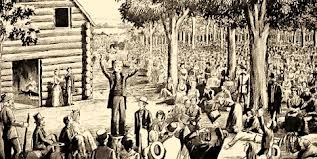The Reverend John Steele was in the right place at the right time to observe the natal days of America’s Second Great Awakening, a great religious revival that spawned novel methods of worship and new Christian denominations. Reverend Steele (b. 1772) was a minister within the Associate Reformed Presbyterian Church. In 1801, he was serving as pastor of a congregation in Bourbon County, Kentucky, when the tremendously influential religious camp meetings took place at Cane Ridge. His religious background provided a unique perspective when he witnessed the events occurring at Cane Ridge.
A Steele letter from February 1802, recently added to the Manuscripts & Folklife Archives unit of the Special Collections Library, contains some of the cleric’s observations to another minister, John Hemphill of Chester County, South Carolina. He begins his missive by asking Hemphill if he has “heard about the news of our Country…I mean that concerning religion?” He then describes the “extra ordinary” modes of worship exhibited at these peculiar outdoor services. “They fall down some as in swooning fits,” declares Steele, and are “quite motionless” while “others are affected when they fall as if in a convulsive fit. Usually after they recover they address those around them in declaring what comfort they have had with God & their surety of salvation & exhort all around them to come to Christ. When they fall a number usually encompass them & sing hymns around them and they also pray over them — Generally I understand more fall under the singing than under that of preaching.”
Not fitting his decorous style of worship, Steele called the meetings ones “of confusion and disorder” where “in the same house & in the same assembly you may hear & see people engaged in preaching, praying, exhorting, singing, falling, rising, running, walking, talking, sitting, lying. See people in all positions–in all situations, all exercises at the same time–their united sounds of different voices” making “the Sylvan plain to reecho from afar.” Steele doubted the sincerity and veracity of the erratic worship, telling Hemphill: “I cannot find on what principles I can call it the Religion of Jesus.” After leaving Kentucky in the early-1830s, Steele continued to pastor Associate Reformed churches in southern Ohio.
To see other religious related collections in Manuscripts & Folklife Archives search TopSCHOLAR. To see a finding aid for the Steele small collection or view a full-text typescript of the letter click here.

